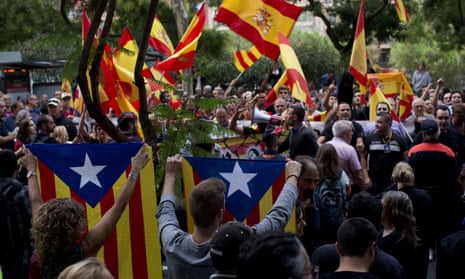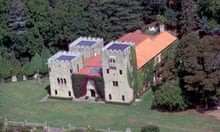The Catalan regional government has accused the Spanish authorities of behaving like Turkey, China and North Korea by blocking websites designed to help people vote in Sunday’s independence referendum.
Over the past week the Spanish government has stepped up its efforts to stop the unilateral vote by deploying thousands of extra police officers to Catalonia and taking control of the region’s finances.
It insists the referendum is illegal and a clear violation of the Spanish constitution.
The Catalan high court has assumed control of efforts to prevent the vote, instructing local and national police officers to stop public buildings being used as polling stations and to seize any material related to the referendum.
On Wednesday evening, Judge Mercedes Armas said the court would take over from the regional prosecutor, adding that recent events had shown that Catalonia’s pro-independence government had “clearly breached” the constitutional court rulings prohibiting this Sunday’s vote.
Armas said the Catalan regional government’s repeated attempts to circumvent a ban on using websites to promote and facilitate the referendum had “consistently shown that the poll will go ahead”.
The judicial intervention came hours after Catalonia’s regional police force, the Mossos d’Esquadra, expressed reservations over being tasked with shutting down polling stations, warning of the risk of “a disruption of public order”.
In a series of tweets on Wednesday, the force said it had told the regional prosecutor that following orders to stop the vote would not lessen officers’ “professional responsibility to consider whether applying them could bring unwanted consequences”.
It stressed the need for particular care over the “principles of opportunity, proportionality and agreement” when it came to the policing operation.
As well as arresting 14 Catalan government officials and seizing almost 10m ballot papers, police and the courts have been taking down websites connected to the referendum.
On Monday police summoned 17 people for questioning over the development of web platforms related to the vote.
A police spokesman told Agence France-Presse the 17 were suspected of “disseminating a website for people to participate in a referendum declared illegal by the constitutional court”. He said they were alleged to have “made it easy for people to get documents … to organise the plebiscite”.
Catalonia’s regional president, Carles Puigdemont, has tweeted links to websites telling people where to vote on Sunday, but the posts were removed after a court ordered that sites used to share such information be blocked.
On Monday evening the website of the large pro-independence group the Catalan National Assembly (ANC) was taken down by Spain’s Guardia Civil. It reappeared at a different address within an hour.
“We received no notification whatsoever from the Guardia Civil,” said an ANC spokesman. “It shows that the government cares more about stopping people from voting than they do about preserving freedoms in Spain.”
A spokesman for the Catalan government described the latest moves as a threat to free expression and said a letter of protest had been sent to the European commission.
“What they’re doing by blocking domain name servers is doing what Turkey does and what China does and what North Korea does,” said the spokesman. “No western democracy does that. The internet is the kingdom of freedom.”
The letter says the online crackdown is part of “the ongoing unlawful repression of the institutions of autonomy of Catalonia” and calls on the commission to act as “the ultimate guardian of the open and free internet, which is truly at stake now”.
Asked about the legality of the Spanish authorities’ actions, the commission referred the Guardian to remarks made by its chief spokesman on Tuesday.
“We don’t have anything to say other than to reiterate our respect for the legal order – the constitutional order – within which all these measures have been taken,” Margaritis Schinas told reporters on Tuesday.
Spain’s interior ministry did not respond to requests for comment.
On Wednesday afternoon Spain’s national court announced it was planning to investigate whether sedition charges should be brought against protesters who took part in a 40,000-strong demonstration in Barcelona against last week’s arrests.
Two Guardia Civil vehicles were attacked during the protest. In a complaint lodged last week, the court’s chief prosecutor named the ANC and another independence group, Òmnium Cultural, as the organisers of the demonstration.







